#montaigne school of english
Explore tagged Tumblr posts
Photo
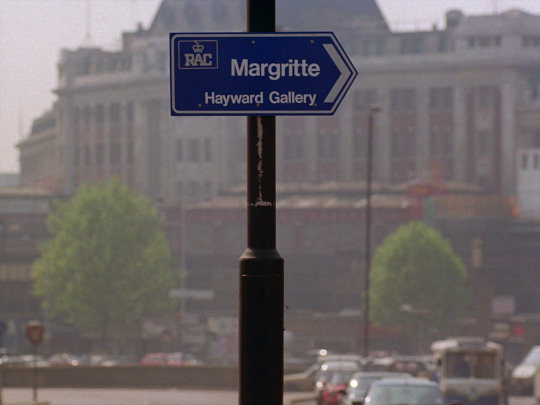

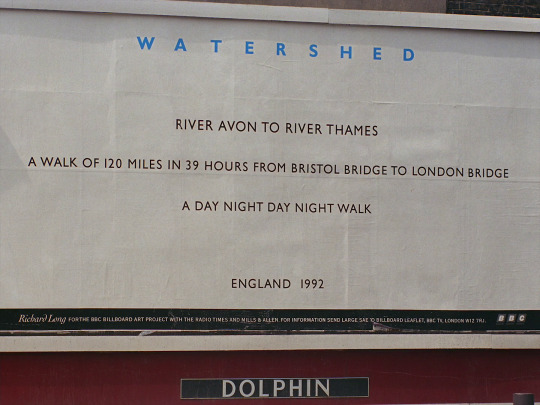
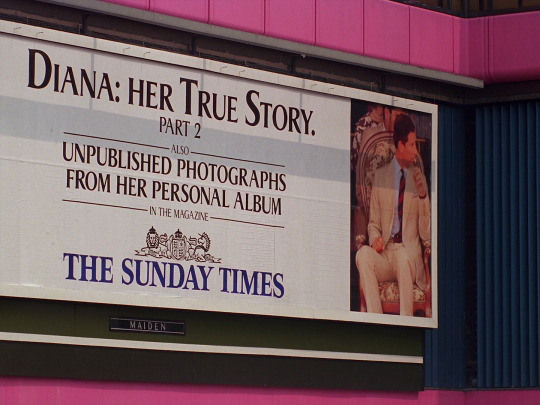
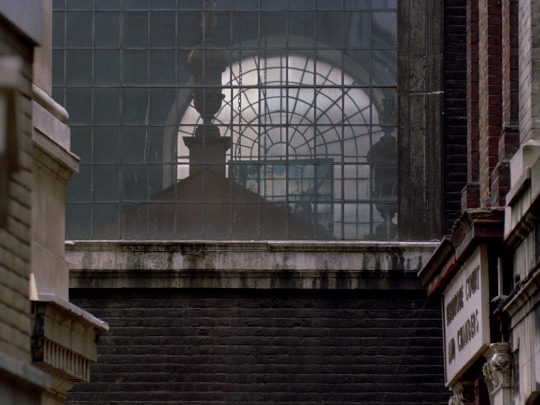

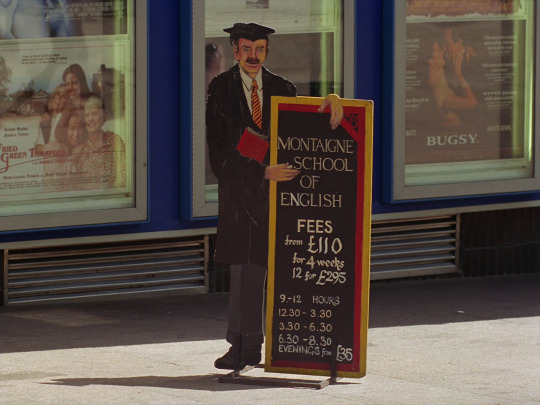
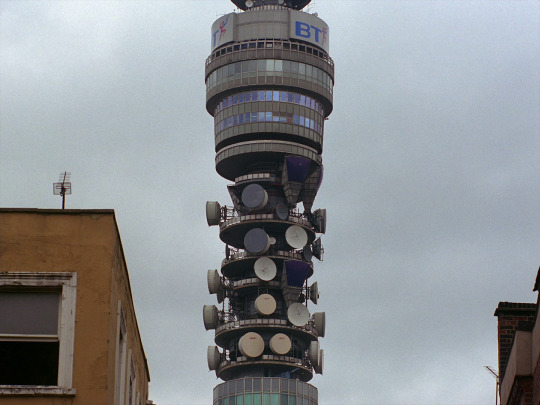

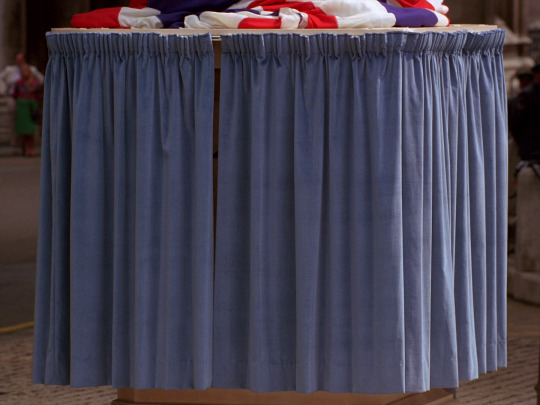
Patrick Keiller
- London
1994
#patrick keiller#london#essay film#documentary 1994#bt tower#london stone#montaigne school of english#richard long#princess diana#billboard#advertisement billboard#hayward hallery#margritte#rené magritte#rene magritte#sign#green man#pub
39 notes
·
View notes
Text
why did they have my school read like three Greek tragedies and excerpts from two Greek epics as the entirety of our classics education. that's like, dick all. we didn't even read any Roman literature
#like. I'm flipping back and forth between Montaigne and Erasmus at work right cos that's what's one my phone#and the number of Latin and Greek writers these dudes are familiar with is crazy but lo que es mas it forms a real usable body of literatur#why was high school English so cursory with everything it covered#We didn't even read the Odyssey in its entirety! just excerpts!
6 notes
·
View notes
Text
The task of a marginalia maven is at right angles to the task of reading a book: It is an attempt to read the reader rather than to read the writer. For several decades now, scholars have been swarming the margins of books in dead people’s libraries. Those margins are among the most promising sites of “textual activity,” to use the scholar’s clinical phrase—a place to explore, analyze, and, it is hoped, find new raw material for the writing of dissertations. Famous readers whose libraries have fallen under such scrutiny include Melville and Montaigne, Machiavelli and Mark Twain. A book invites various kinds of engagement, depending on the reader. Voltaire (whom Nixon admired, to judge by his extravagant underlining in the Durants’ The Age of Voltaire) scribbled commentary so incessantly that his marginalia have been published in volumes of their own. Voltaire liked to argue with a book. Nixon did not. He had a lively mind but not, when reading, a disputatious one; he restricted his marginalia almost exclusively to underlining sentences or making other subverbal marks on the page—boxes and brackets and circles. You get the idea that he knew what he wanted from a book and went searching for it, and when he found what he wanted, he pinned it to the page with his pen (seldom, from what I’ve seen, a pencil). In his method, Nixon resembled the English writer Paul Johnson. I once asked Johnson how, given his prolific journalistic career—several columns and reviews a week in British and American publications—he managed to read all the books he cited in his own very long and very readable histories, which embraced such expansive subjects as Christianity, ancient Egypt, and the British empire. His reaction bordered on revulsion at my naivete. “Read them?!” he spat out. “Read them?! I don’t read them! I fillet them! As it happens, Nixon was an avid reader of Johnson, whose books he often handed out to friends and staff at Christmastime. John Adams, another busy producer of marginalia, liked to quote a Latin epigram: Studium sine calamo somnium. Adams translated this as: “Study without a pen in your hand is but a dream.” Nixon acquired the pen-in-hand habit early, as his surviving college and high-school textbooks show, and he kept at it throughout his life. For Nixon, as for the rest of us, marking up books was also a way of slowing himself down and attending to what he read. He was not a notably fast reader, by his own account, but his powers of concentration and memorization were considerable. Going at a book physically was a way of absorbing it mentally.
Go ahead! Mark up your books! Historians will love you for it someday.
5 notes
·
View notes
Photo




Milestone Monday:
Joyeux Anniversaire M. Montaigne!
Today we honor the birth of French philosopher Michel de Montaigne, born on this day, the 28th of February in 1533. Not only was Montaigne one of the most significant figures of the French Renaissance, but he is also widely considered to have popularized the essay as a literary form, so you can thank (or curse) him for all those late nights facing down a deadline during your school years!
To celebrate this occasion, we present the Riverside Press edition of Essays of Michael, Lord of Montaigne, written by him in French and done into English by John Florio. This three-volume set was published by Houghton, Mifflin & Company of Boston and New York, and printed by Riverside Press in Cambridge, Mass. The volumes were published over three years between 1902 and 1904, with each volume limited to 265 copies.
The book was designed by lauded typographer and book designer Bruce Rogers. Rogers designed books for Riverside Press from 1895-1911, initially working on trade publications and designing advertisements for the Atlantic Monthly. From 1900 onward, Rogers led Riverside’s Department of Special Bookmaking, where he oversaw the design for the presses fine press output. It was for this edition that Rogers designed and cut his first typeface, a Venetian styled type appropriately named Montaigne.
Each volume features a different portrait on the frontispiece. Volume one contains a wood engraving of Montaigne based on a portrait by French engraver Thomas de Leu. Volume two features a portrait of the translator, John Florio, while the third volume showcases Marie de Gournay, the original editor and publisher or Montaigne’s work. The title page of the first volume bears the motto of Riverside Press: “tout bien ou rien” – do it well or not at all, as well as Montaigne’s famous skeptical remark, “Que sais-je?” – what do I know?
-Olivia, Special Collections Graduate Intern
#milestone monday#Birthdays#milestones#michel de montaigne#essais#riverside press#Essays of Michael Lord of Montaigne#houghton mifflin#bruce rogers#John florio#marie de gournay#thomas de leu#wood engravings#fine press#olivia
99 notes
·
View notes
Text
Empty Space 3


Empty Space - Chapter Three
summary: mars’ day begins like any normal high school student, then takes a world-changing turn. [4.4k]
CW: blood, violence, character death
series tags: canon divergence, slow burn, friends to lovers, fluff, memory loss, [REDACTED]
Chapter Two | Chapter Four
Mars
“Happy Monday, class. Today we’ll be going over our projects on influential figures in English literature,” Mr. El Din announces to his third period students. The man’s a similar shade of brown to Mars amongst a population of white. He’s sitting on the edge of his desk at the front of the room, behind him ‘PRESENTATIONS NOVEMBER 7TH TODAY!!’ scrawled out across the blackboard.
Mars is curling the edge of a flashcard as she’s seated near the back of the class. Anxiety is slicking the lines of her palms and her leg bounces beneath her desk.
“Now I just want to reiterate that we’re trying to get a whole dozen groups finished today, so if you can keep your spoken portion to a max of two minutes, that’d be appreciated…” The teacher’s words fade out of Mars’ attention. She can’t be bothered to listen right now.
Not when her partner hasn’t shown up to class.
There were other underlying stressors that the girl was dealing with today, such as the ominous phone call this morning from Joyce Byers, mother of Dustin’s friend Will, or the lingering headache she sustained from yesterday evening. But when Steve Harrington, the boy she’d done a favor by completing the project all on her own, conveniently doesn’t show up to third period Lit? Mars thinks she might ralph from the intensity of her nerves.
I can’t believe I let that dumb, doe-eyed ball-bouncer swindle me, Mars thinks to herself. She’d left work early at Benny’s last night just for this project and ended up knocking herself silly on the walk home. So not only was she down a dreamy—c’mon, he’s not that cute!—piece of her Michel de Montaigne presentation puzzle, Mars would be missing out on a few dollars in her next paycheck. The teen was kissing the passing grade she planned for goodbye every moment the presentation drew closer.
“—Now I think we’ll go alphabetically to tighten up any time between groups, so let’s start with Abigail and Reba,” finally makes it through to Mars. The girls mentioned drag themselves from their respective seats and announce their influential figure, a German essayist Mars can’t pronounce the name of. The clock ticks slowly when they begin listing interesting facts and quotes, and Mars takes their work as a sign that her flashcards would be at least on an acceptable level for grading.
And that’s if Mars doesn’t fumble at public speaking. The concept of speaking to one person her age was anxiety-inducing on its own, and the thought of lecturing two dozen about silly quotes for a silly project did nothing to ease Mars’ tension.
The first group finishes quickly enough, and Mars is clapping softly with the class as the next group is ushered before the blackboard. Two more, Mars thinks. And then I’m up. Don’t freak out. I swear to God if I begin to—Yeah, she’s starting to shake in her chair. Luckily her breathing hadn’t gone, yet! Hyperventilating amongst a horde of teens would not be any less embarrassing than sputtering her way through a note-card reading. Maybe not a horde of teens, exactly, but their collective gazes could obliterate a mountain if pressed, Mars imagines.
A collective shift in attention dominates the classroom when a student barges in from the hallway. Harrington.
He’s a tad flushed at the throat, collar of his striped polo crinkled and unfolded on his neck. The pink of his lips is bright and smudgy against the pale of his skin.
Mars feels a bit of the tightness in her shoulders dissipate, but her stomach dips when she pieces together where Steve had come from—or rather, who he’d been with.
Steve freezes when he notices everyone’s pointed stares. Mr. El Din makes no move but sternly says, “Have a seat Mr. Harrington.”
The boy obeys, giving a curt nod to the two boys standing at the front of the class, and quickly moves to his seat. His movements are slightly rushed and he’s bumping shoulders with the orange duffel at his side, and Mars tries not to fall out of her chair in second-hand mortification.
He’s finally sitting at the empty desk at the girl’s right when the duo presenting starts speaking once more. Steve sighs and leans back, slouched in near nonchalance. Mars is looking at him from her peripheral.
She wordlessly parts a select few notecards from her stack and leans to set them in front of Steve. ‘Read these’ is headed at the top of each. His job was straightforward: read off the quotes, pretend to know the material, and profit a decent grade while Mars turned in the essay she’d prepared the night before.
The girl admonishes in a low voice, “Glad you could make it, Harrington.”
“Thanks, Henderson,” Steve whispers lowly across the narrow aisle.
Mars spares a turn to face him. Steve’s looking straight at her, their gazes meeting and Mars swears she tastes cherry lip balm on her tongue.
I hate cherry flavor.
“You’ve got a little…” Mars motions to his bottom lip with a finger. He starts and scrubs away a glittery patch of rose-colored shine with his sleeve and folds the collar of his striped polo back down. Mars gives her attention back to the group ahead, finishing their speech and receiving some claps.
When Steve speaks next, he’s closer to Mars by a few inches, hunched over in the space between them. “Your mom sounds like a nice lady,” he says, hushed.
Mars swings her head to look at Steve. “What?” she’s still whispering.
“She picked up when I called yesterday. Super sweet. Voice like an angel.”
Mars is shaking her head. “Claudia’s not my mom.”
Steve’s brows furrow.
Even if Mars wanted to explain, she’d still be cut off by Mr. El Din’s call across the classroom.
“Next up we have Mars and Steve,” the English teacher announces.
Cold trepidation follows Mars to the front of the class like a ball and chain. Her flashcards are clenched tightly in her grip and her eyes dart between the different pairs of shoes of her peers.
Steve’s standing beside her and Mr. El Din is talking again. “Thank you so much for joining us, Mr. Harrington.”
The boy in question nods, a smart grin pointed back at their teacher, “The honor’s all mine, sir.”
There are some laughs from the other students, but Mars is forcing a smile.
Mr. El Din only gestures at the two teens in response. “Who will you be telling the class about today? Please.”
Mars sucks in a shaky breath. There are so many eyes on her. When she opens her mouth to speak, Steve’s already started.
“Some guy named… Michelle deh Montane. He’s a French guy who was really important during the Renaissance.” Steve is looking solely at the note card in his hand. “And, apparently, he’s to blame for us having to write essays in school. Michelle, uh, really contributed to the whole ‘Renaissance’ thing.”
He pauses, having skimmed through to the end of his first notes. Steve looks over to Mars and motions for her to go next.
“Y-yes—” burning a hole into the back of the class with her eyes, “—Michel de Montaigne’s writings in the 1500s would go on to, um—” she’s swallowing down a crack in her voice, “—influence modern psychology and directly impact the Western writers that followed him. He’s known for his quirky style of writing in his most famous work Essais.”
Mars copies Steve’s previous motion back to him. And when he begins to speak, she takes the opportunity to refill her lungs with as much air as she can.
“Socrates and… Plu-tar—Plutarch? Plutarch. Yes, Plutarch. Socrates and Plutarch were some of Michelle’s favorite philosophers to quote… And this guy has lots of quotes to give. I’ll just, uh, read some of them for everyone.” Steve turns to his last note card.
He clears his throat. “First we have, oh, this one’s kinda funny: ‘On the highest throne in the world, we still sit only on our own bottom.’” Steve earns a few more laughs, but Mars doesn’t have to force her smile this time. “Next, he said, ‘I find I am much prouder of the victory I obtain over myself, when, in the very ardor of dispute, I make myself submit to my adversary’s force of reason, than I am pleased with the victory I obtain over him through his weakness.’ Kinda badass. And finally—”
Steve pauses, but it’s only for a second. Mars finally builds enough courage to at least look at Steve, even for a moment. It’s two seas of cocoa, one dashed with seafoam the other with molten gold crashing up against each other, they’re spitting buzzing mist and it’s wonderful.
He doesn’t shake the gaze while he reads off the final note, “—‘Nothing fixes so intensely in the memory as the wish to forget it.’”
Mars blinks. She turns back to her class and gives a bow of her head. “T-thank you.”
Steve follows her to their seats and the other students repeat their applause for a fourth, unenthusiastic, time. Mars almost collapses into her chair with relief, nerves reverberating from her chest to her fingertips.
“Good job, you two. Let’s call up Laurie and Matthew.”
✦✧✦✧✦✧
For a rare moment, the packed halls of Hawkins High School are a breath of fresh air to Mars. Even with the rampant body odor.
When the bell had rung for the end of third period, she’d basically bolted from the class. She’d been sitting silently since the end of her presentation and only moved to hand Mr. El Din her copy of their full write-up.
Mars is just thankful it’s over. Steve had shot her a thumbs up that she weakly returned, but he’d otherwise not said a thing. I don’t want to look another peep at his stupid, pretty face.
That is, until she’s colliding with him in the middle of the hall. Mars was staring at the floor as she headed to her locker, head down and thoughts loud in her head. He’d cut in front of her to get her attention.
“Oof!” Mars jumps, cheeks flaming a bright ochre. Her forehead’s reeling from bumping headlong into his firm—what the fuck, Marsie—chest. She steps back and looks up to Steve.
“Don’t tell me you're not going to accept my gratitude, Henderson.”
“For what?”
“‘For what?’ You pulled through on this project. From what I peeked at in the essay bit, El Din’s going to pass us. I’ll eat my pants if he doesn’t.”
Mars pulls at her sweater sleeve. “And the presentation?”
“C’mon, didn’t you see how bad Reggie’s went? The guy gabbed for three minutes straight.”
The girl allows herself to smile. And he’d pronounced Don Quixote four different ways.
“You know, I think I might keep this,” Steve’s holding up a flash card.
“Oh?” Mars asks with a quirked brow.
“Steve!” cuts from a few doors down. It’s Tommy H., his arms are crossed, and his grin is wicked as he waits by his locker.
Mars readjusts her bag on her shoulder. “I’m gonna get going, Harrington.” And she’s walking away.
“I owe you, Henderson!” Steve’s saying after her, and Mars shakes her head as she smiles to herself.
And when Mars goes about the rest of her school day, she tries to convince herself she’s not getting a crush on Steve Harrington.
✦✧✦✧✦✧
This time when she’s walking up to Benny’s, Mars doesn’t have a crippling headache and she’s covered in significantly less blood. Well, no blood, but that’s still less.
It’s as cold as yesterday had been, but even more windy. Mars has her hair pinned back with her favorite bandana, a bright, burnt orange square of fraying cotton. She can’t quite put her finger on where she’d gotten it, or how long she’s had it, but the word clothesline comes to mind. The bandana does its job well, keeping Mars’ hair out of her face when biting gusts of wind threaten to make her head a bird’s nest.
On the breeze is a zing that foretells rain, and a look at the sky guarantees it. “Cumulonimbus!” Dustin would say. Or was it nimbostratus?
Dustin was not here, though. And if Aunt Claudia had her way, Mars wouldn’t be, either.
When Joyce Byers called the Henderson house before school that morning, asking after her son with worry in her voice, Claudia and Dustin assured the mother that Will most likely went to school early. He’d done so before, Dustin told Joyce.
But Will Byers hadn’t shown up to school, and Dustin came home to tell Mars and Aunt Claudia that the chief of police came in to question him and his friend. Will was missing.
Claudia had erected a stay-at-home rule in accordance with chief Hopper’s advice. Dustin and Mars were not to leave the house once coming home from school.
And Mars has officially broken that rule. Sorry, auntie.
Better to ask for forgiveness than permission, right? She’s only going to Benny’s, Mars tells herself, to make up for leaving early the night before. She’ll just ask her boss to drive her home and slip inside her bedroom without Claudia noticing. Easy as cake.
Mars raps her knuckles against the back door and swings it open. It’s a natural movement, built up after months of working for Benny. She’s stepping into the pantry, pulling off her bag and hoodie. The jukebox is playing lowly through the diner when its namesake strides into the backroom.
“It’s Monday,” Benny says gruffly. Mars notices a distinct lack of grease on his shirt.
“I figured I could help close up the diner to make up for those hours yesterday.”
“We’re closed.”
Explains the grease, Mars thinks back to the empty parking spaces out front, and that.
“Oh.”
Benny’s looking down at Mars intently, just long enough to set her on edge from his two-heads-higher position. Then he’s looking into the kitchen, then back at Mars.
“I do have something you can do for me, though.” The burly man motions for her to follow him, and she does, but then he’s stopping right at the threshold to the kitchen.
“Um, Benny?”
“Now, actually wait here a sec—” Benny holds out a hand.
Mars stills, sticking her feet to the floor. Over the tune of Johnny Cash, the girl can overhear the man speaking quietly in the other room. She pulls her brows tight in confusion. I thought the diner was closed?
Benny’s standing in front of her again. “C’mon in.”
When her boss had told her he had something for Mars to do, she’d been expecting to mop or scrub the grill.
In no way had Mars expected to see a bald, tiny human buried in a shirt three times their size. A girl?
“Kid, this is Mars,” Benny says softly. “She works with me, she ain’t going to hurt you.”
The child is looking at Mars with wide, watchful observance.
When the girls’ eyes meet, a faint ‘funny’ echoes in the back of Mars’ mind. Like a feather-touch, it brushes her brain and quickly dissipates.
“Hi?” Mars offers as gently, but curiously.
“Mars is gonna keep you company while I get everything cleaned up, okay? So we can get you settled.”
Mars nods despite her confusion. The small child nods, too, meekly.
Benny steps out to the hallway. The room is much less full when his imposing figure’s gone, leaving the two girls in each other’s presence.
Mars shifts from foot to foot. What the hell do I do, exactly? The only experience in kids Mars has is Dustin—
Oh!
“So, um, do you like comics?”
Mars is only met with a blank stare.
“Comic books? Superheroes?”
More staring.
“Hm. Okay, yeah that’s a bit of a boy thing, I guess…” What else does a twerp like Dustin enjoy? “Do you like ice cream?”
“Ice…cream.”
Wow, Mars thinks, her first words.
“One sec, I’ll get some!”
Mars goes straight for the freezer. With a heavy lift of the latch and a dive into the frozen box, the teen is scooping up a small tub of strawberry ice cream.
“It’s pint-sized, just like you!” she says, handing the smaller girl a spoon.
There’s a moment that Mars watches Pint-Sized do nothing and fears she’s made the wrong move. The doubt’s quickly dispelled when the girl starts shoveling spoonfuls of the pink treat into her mouth.
“Wait, I wouldn’t—”
—And she’s got brain freeze! Pint-Sized is palming her eyes, and Mars panics.
“It’s okay, it’s okay! Hey, it’s just brain freeze and it’s so easy to fix, okay? Watch me!”
Mars waits for the kid’s audience to lift up her thumb to her lips.
“Just like this,” she’s sticking her thumb over her tongue. “Lah bis!” and her thumb’s warming the roof of her mouth.
Pint-Sized cautiously copies Mars, brows tucked together tight in discomfort. They wait together for a moment, fingers in their mouths, and Mars breaks into a grin. Slowly Pint-Sized’s brows unfurrow, and she’s back to eating ice cream. Though, at a much slower pace.
Mars watches over the girl with curiosity. The room’s filled by the sounds of Pint-Sized’s eating and the trickling in of music. I’ve gotta stop calling her Pint-Sized.
“Sorry, I never got your name,” Mars tries.
Pint-Sized slows her lapping of the spoon. She turns over her left wrist, and Mars leans close to read the ink on her skin.
011. Eleven.
Mars looks into Pint-Sized’s eyes. There’s that tickling sensation and ‘name’ pops into Mars’ mind.
“That’s… not your name, is it?” Nausea licks at Mars’ throat. How fucked it would be, to be reduced to a number.
Pint-Sized—no, Eleven—nods at Mars’ question. “Eleven.”
“It’s nice to meet you, Eleven.” And Mars sends a warm smile to the girl opposite her.
Eleven returns it.
Benny takes this as his cue to enter back into the kitchen with a collection of coffee cups. He drops them straight into the wash basin, and they make that grating clink noise when they collide that sends irritation straight up to the front of her emotional queue.
“Smile looks good on you.”
Eleven looks oddly up at Benny.
“You know, a smile?” And he does so.
Eleven glances between Mars and the man and gives another smile. It’s perfectly warm and Mars has grown fond of it, she thinks, as she taps her heel along to the Jefferson Airplane song the jukebox has playing.
The joy on Eleven’s face disappears, though, when a knock sounds from the front door. Her breathing picks up again, and Mars wonders what happened to make her this way.
“You girls just sit tight. Whoever it is, I’ll tell ‘em to go away real quick, alright?”
Mars watches as his voice visibly soothes Eleven, even if it’s miniscule.
“Are you okay?” Mars asks, but Eleven just watches after Benny.
His voice doesn’t quite carry into the kitchen from where he opens the door, and Mars shuffles a bit closer to Eleven so she, too, can see Benny. His large frame is blocking Mars from seeing whoever’s at the door.
A few words do make it to them. “Connie Frazier, Social Services.” And Mars feels a weight sink in her gut.
“Are you scared of them?” Mars tries to get Eleven’s attention, but the girl is frozen to her seat on the counter.
And then Benny’s letting a woman in, “Sorry, again, for trying to turn you away there.”
The woman’s following him towards the kitchen. The hair on the back of Mars’ neck stands straight up at the sight of her.
Bad bad bad bad bad bad—
Mars is inching towards Eleven, hands itching and legs pulsing.
The woman’s stopped trailing behind Benny, digging in her purse.
Benny’s just being nice. “You know, it’s funny.”
She's pulling something out.
Benny’s turning back to her. “Your, uh, voice sounds different on the—” and she’s shooting Benny Hammond in the head.
A spigot of blood follows the bullet’s trail, and Benny’s falling to the ground.
There’s an absence of feeling that Mars experiences in the following moments. It’s as if her mind had gone silent and her body had just acted.
Mars pulls Eleven off the counter and pushes the girl behind her. A blink, and they both bolt for the back pantry door.
And then two men are busting in through their exit, guns raised, and Mars again throws herself in front of Eleven.
Another blink, and the shelves of the pantry fling their contents out at the attackers. There’s a 96 ounce can of barbecue sauce striking one man squarely at his temple, a spoon flying at lightspeed into the other’s forehead, and both collapse to the floor.
Mars spares no moment and books it out the door, heading straight for the tree line. Eleven’s just behind her and they’re gone.
✦✧✦✧✦✧
Dustin
Dustin’s breaths are coming out in puffs of steam, and he peddles along Mike and Lucas. Their party hikes down the weary path of Mirkwood, traveling swiftly toward their destination. A rumble in the sky foretells a dangerous quest and…
It’s way past when his mom puts him to bed.
But it’s not like he ever goes to sleep when she says—it’s more of a formality, a ritual that Dustin finds a modicum amount of comfort in—and he doesn’t have a bedtime no matter what anyone thinks and, like, he’s twelve now so why would he even follow a bedtime rule if he had it? That’s so stupid and he’s insulted that his mom would even think to insinuate he has a bedtime!
Yes, Dustin has impeached the ruling of his mother, who so foolishly thought she could control a mind such as his. He so cleverly outwitted her, spinning a tale of studying for Gursky’s upcoming test.
And due to this show of cunning, he is able to join his party on the valiant quest to find their missing friend, Will. No matter how fraught with danger the path may be, Dustin Henderson was ready to save the—
A wet droplet falls from the heavens and hits the brim of Dustin’s cap. Oh, shit.
One droplet turns into three, then four. And when the party’s arrived at their destination, Dustin looks to the sky.
“Hey, guys? You feel that?’
A thunderous rumble from the sky is his response. Both Lucas and Mike are staring down into the woods from their bikes, each searching over the barrier chief Hopper had set along the road.
It’s dark and it’s beginning to rain and Dustin does not want to die a soggy forest death.
“I think maybe we should go back.”
“No.” Mike says, firmly. “We’re not going back. Just stay close.”
Dustin hesitates.
“Come on.”
He’s still watching as the two other boys duck under the barrier and head into the trees, flashlights casting deeper shadows on the already pitch-black forest.
Mike reasons, “Just stay on channel six. Don’t do anything stupid.”
Dustin tightens his jacket around his body and adjusts his cap. He swallows, and he likes to picture a green little monster being sucked down.
“Hey, guys, wait up!” They don’t wait up. “Wait up!”
He catches up quickly when they pause their trek, both boys squinting as the sprinkle of rain hits their faces. A reinvigorated gust of wind sends a watery chill across each boy’s back.
“Scared of a little rain?” Lucas jibes.
“No, I’m just being realistic. If we all wake up sick tomorrow, you really think our moms are going to believe that we, coincidentally, all caught colds at the exact same time?”
Thunder cracks and the rain’s suddenly coming down in cacophonous buckets.
“It won’t matter if we find Will,” Mike assures. He pulls up his hood and he’s heading the party, marching deeper into the woods.
“Yeah, but can we find him if we die?”
“Shut up, Dustin!”
Mike starts yelling out Will’s name into the black, and Lucas and Dustin follow suit.
Dustin’s shoes are getting soggier by the minute, his toes battling the devious horde that is wet socks. His hat’s usefulness had fallen off its once promising trajectory, not so effective at combating sideways rain. The coat he’d been wearing hadn’t lasted even ten minutes in the downpour, so that was great.
Dustin loved Will like a brother, but this whole search party business was really becoming a more than questionable endeavor.
“Will, I’ve got your X-Men 134!” He heaves, giving it his last effort. Tired from mucking through mud and tripping on damp tree branches.
A particularly gnarled shadow startles Dustin backward.
That little green monster’s climbed back up his throat and has staked his claim. Dustin is officially scared shitless.
“Guys, I really think we should turn back.”
“Seriously, Dustin?” Lucas is biting again. “You wanna be a baby, then go the hell home already!”
“Lucas, I'm thinking logically!”
“No, you’re just being a big sissy!”
Dustin gives that green monster a microphone. “Did you ever think Will went missing because he ran into something bad? And we’re going to the exact same spot where he was last seen? And we have no weapons or anything?”
“Dustin, shut up.” It’s Mike’s turn to cut.
“I’m just saying, does that seem smart to you?”
“Dustin, be quiet right now,” and Mike’s holding his arms out in front of the boys behind him.
Dustin’s ready to talk back, but a distinct rustling nearby sends his heart rate up into the bajillions. Even through the heavy rain, he can hear it, too.
“Did you guys hear that?” And the sound of moving brush is behind them.
All three boys flip in a 180-degree turn, flashlights pointed ahead.
Then the rustling’s closer, just to the right of them, and Dustin says a sweet prayer to the little green monster choreographing the dance it’ll perform on his grave.
Mike and Lucas flinch beside him, and when Dustin finally looks, he’s met with the absolute last thing he could’ve imagined.
In the white of three torchlights, Dustin’s older cousin Mars stands drenched from rain in her Benny’s Burger t-shirt. A hand is held to protect her eyes, but her other is outstretched behind her.
In a collective movement, Dustin, Mike and Lucas peer around Mars Henderson to spy a bald-headed girl quivering in the cold and squinting at the light.
“What. The shit?!”
#steve harrington x reader#steve harrington x oc#stranger things fanfiction#steve harrington#steve harrington fanfiction#autism coded#neurodivergent reader#fanfiction#oc fanfiction
19 notes
·
View notes
Text
Story by Andrey Pertsev with additional reporting by Svetlana Reiter. English-language version by Kevin Rothrock.
Daria Dugina, the daughter of Eurasianist philosopher and ideologue Alexander Dugin, died behind the wheel of a Toyota Land Cruiser on the evening of August 20. The vehicle exploded while in motion — the result of a bomb placed under the driver’s side of the car. Just two days later, Russia’s Federal Security Service accused the Ukrainian intelligence community of orchestrating the murder, pinning it on a Ukrainian national named Natalya Vovk (arguing that she deliberately targeted Dugina, not her father). Though the Zelensky administration has denied any involvement in the incident, many Russian politicians and pro-Kremlin media figures are calling it a Ukrainian terrorist attack and demanding retribution. In the years before her death on Saturday, Daria Dugina became one of her father’s closest associates, fashioning herself as a popular “political expert” and pundit who criticized the West with every breath and welcomed the invasion of Ukraine in February 2022. Meduza recalls how Dugina transformed from a typical, curious philosophy student into an outspoken advocate for war and wild conspiracy theories.
Much of the reporting and commentary about Daria Dugina’s violent death on August 20 revolves around her father, Alexander Dugin — a philosopher whose scholarly misadventures over the decades are well-documented and whose supposed influence over Kremlin decision-making is notoriously exaggerated in the West. Dugina’s own story is relatively obscure and far briefer, but she, too, was an intellectual force in Russia. Or she was shaping up to become one, at least.
Meduza spoke to multiple sources who studied with Dugina in the early 2010s at Moscow State University’s philosophy department, where she shined as one of the brightest, more talented students. In college, Dugina was fascinated with the Platonist school of thought, she played the flute, and she had her own “electronic music project” with a name inspired by Heidegger's work on existentialism. Several times, she plotted to run away from home. She won an academic scholarship to study at the Bordeaux Montaigne University in France from 2012 to 2013. People who knew Dugina at this time in her life point out that she was interested in many things, but not her father’s Eurasianist ideas.
And then something changed.
4 notes
·
View notes
Text
HPHM OC Profile ✧
Udelia Ripley
" Udelia was born with a silver spoon in her mouth, but mess with her and it turns into a silver knife."

Full name: Udelia Elisandra Serafin Castillo Ripley
Nicknames: Delia, Deli, Dee, Lia, Rip
Gender: Female.
Birthday: 4th of November, 1971
Born: Surrey, England.
Parents: Theodora Klein Serafin Ripley - Hufflepuff, Pureblood -, Oscar Montaigne Castillo Ripley - Pureblood who attended an elite wizarding school in Spain before moving to England.
Siblings: Julian C. Ripley (b. 1963), Monique Klein S. R. (b.1964), Emilia Elis M. R. (b.1976) - Emilia is the only one of the four who doesn't attend Hogwarts, being sent to Beuxbatons instead.
Ethnicity: English, Spanish, Germanic.
Blood status: Pureblood.
MBTI: ESTJ-A
Hogwarts House: Ravenclaw.
APPEARANCE
Eyes: Lilac, natural, with dark ginger lashes.
Hair: Naturally ginger, long and curly sort of wavy. She likes styling it in various ways and enjoys trying new hairdos.
Height: She’s the tallest of her sisters something she hated for a long time cause it made her feel less feminine, but a few years into Hogwarts she notices.
• Caramel-brown skin with dark freckles.
• Throughout her childhood and early teens, due to her insecurity about her height and size, Udelia took very good care of herself with expensive creams and oils, detoxing diets, and beauty sleeps. All that gave her really good skin and hair.
• Her nails are always pristine and painted. She wears lots of jewelry regularly and looks like a walking constellation from all the precious stones.
MAGICAL ASPECTS
Wand: Acacia wood with fairy wing core, 11½", supple flexibility.
Owners of Acacia wands were generally subtle wizards, as wands made from this wood were generally unsuitable for what Ollivander termed "bangs-and-smells magic". Acacia was difficult to match with a wizard, as the wood generally refused to produce magic for anyone but their owners, but conversely, seemed to withhold their full power from all but the most gifted wizards.
"This core makes for a light, airy wand, and is the absolute best for Charms. They also signify a connection to the mystic, so these wands, despite their relative rarity, are used by nearly half of known witches and wizards with the Sight. Despite their astounding strength in Charms, they are merely average in Defense Against the Dark Arts and Transfiguration, and will often fail at hexes altogether." (.)
Patronus: Sooty Albatross - they have a nice wide wingspan, beautiful black feathers and a sideline on their beaks that makes it seem like they're smiling. Despite being a talented wizard she has never actually produced a corporeal apatronus.
Abilities: Her parents suspected she had the talent of sight as a youngster - like her older brother - but after meeting Trewlany, she shut off that ability as much a she could, afraid to become just as looney. So the ability became very stiff and she'll only have a weird dream once a year or so.
Boggart: Being unwated and ignored - taking the form of her family and friends turning their backs on her, whispering with each other things about her.
Riddikulus: They turn around previously hidding a surprise birthday party for her, with hats and a cake.
Amortentia: She smells Stargazer Lily fragrance her mother wears, Honey pudding, Petrichor (the earthy scentproduced when rain falls on dry soil), and fresh watermelon.
MISCELLANEOUS
Pets: A Cornish Rex cat, Pollux.
Things she always carries with her: Lip balm made from Mandrake sap, leather gloves, her wand, a locket with pictures of her siblings, a peacock quill, and a wax seal ring with her family's coat of arms.
Lucky Amulets: Her favorite jewelry - a lapis lazuli stone necklace, golden opal earrings, and a head chain with star shaped diamonds she wears on special occasions.
BEST FRIENDS
Udelia is a year older than the Jacob's siblings' crew so she isn't really friends with the squad, except maybe for Andre. I could see her commissioning him to design outfits for her and having afternoon tea in Ravenclaw common room.
She's been Ravenclaw's prefect while Bill was one as well and so they might've shared a few words every now and them, but never to the extent of becoming friends as they have pretty distinct personalities.
ACADEMICS
Favorite Classes:
Astronomy
Arithmancy
Transfiguration
Charms
Least Favorite:
Potions
Care of Magical Creatures
Flying
Favorite Professor: Professor McGonagall. She finds Minerva very classy and poise, and looks up to her very much.
Least Favorite: Professor Kettleburn. She understands he doesn't come from a bad place in his personality, it's just that he's not her kind of people and wished somebody more conscious was teaching thw class.
Quidditch: She gave up on her "quidditch carrer" right at the tryouts. Too much sweating and screaming and bugs swallowing involved and she preferred not.
Favorite Team: Whichever her older sister is playing for which were The Appleby Arrows for a short while after Hogwarts, then the Hollyhead Harpies for four years, and lastly Puddlemere United on which she got more established and popular than the previous teams.
(Sza really embodies how I imagined Udelia to look like)

Udelia is one of the newest OCs I came up with, and I'm still weaving her into the storyline, but something tells me she either knows or owns something my MC needs. She's also the wealthiest of all my OCs.
21 notes
·
View notes
Text
A long navigation
The campaign library that Larrey frequents to learn more about tropical diseases is admirable for its variety, abundance, and practicality. Due to the lack of space, Bonaparte insisted that it be made up only of small in-octavo. Nothing is missing. President of the Arts and Sciences Commission, the general and philosopher Caffarelli took care of it, admirably assisted by Arnault, playwright, poet, from the ertswhile "court" of Milan. About five hundred and fifty volumes arranged in strong oak boxes fitted with a locked door, forming library shelves, summarize ancient and contemporary history, general geography, mathematics, physics, chemistry, medicine, mechanical sciences, architecture, zoology, botany. For literature, the choice is classic, but eclectic: poems by Homer, Virgil, Ossian (Bonaparte's favorite poet), La Fontaine, Goethe with The Sorrows of young Werther, but also Plutarque and his Life of Illustrious Men, Rabelais , Montaigne, Shakespeare, and of course, Voltaire, Rousseau.
To overcome the boredom of a long navigation, they invite one another to dinner from one boat to another, they visit one another when the sea conditions allow it. Larrey, like the others, is delighted, but notice nevertheless that promiscuity and boredom, embitter the characters. The sailors accuse the infantry of hindering their maneuvers, and themselves find inconsiderate the artillerymen and horsemen. Everyone agrees, however, to rail against scientists, civilians who are useless, whom Lannes would like to see thrown into the sea by his grenadiers! It is only a joke to relieve the bad mood to see Bonaparte, who lets his title of general be preceded by that of member of the Institute, show them so much respect! Awkwardly, the scientists lend the flank by giving substance to rivalries of discipline, schools, and especially precedence at the tables of the general staff or naval officers. If Larrey, both a soldier and a scholar, is preserved by the prestige of his functions, Bonaparte, despite his authority, prefers to retire to his cabin where he now takes his meals away from those nuisances.
As the fleet is in sight of the islands of Gozo and Malta, the look-outs signal many sails far to port. If it's Nelson's English, they've certainly seen us! Bonaparte quickly assembles a Council of War aboard the Orient, attended by Larrey [...]
Relying on Admiral Brueys for the preparations for combat, [Bonaparte] summons - an unusual trait of this elusive character - the draftsman Dutertre and asks him to draw up a portrait of the main army chiefs and scholars: Bonaparte, Brueys, Caffarelli, Kléber, Murat, Lannes, Berthier, Junot, as well as Monge, Berthollet, Dolomieu, Desgenettes and Larrey.
Dutertre chalks out his sketches, the general-in-chief writes a brief note on the expedition. When everyone has finished, Bonaparte puts the whole thing in a bottle which is hermetically sealed.
If the fight turns out to be hopeless, this bottle will be thrown into the sea before scuttling the Orient.
The alarm becomes a party as soon as the look-outs realize that it is the convoy of the Desaix division of which they had lost track. Leaving the deck of the Courageuse, Desaix and Monge go up to the deck of the Orient where everyone, Bonaparte first, welcomes them with warmth and affection. Soldiers, scholars and artists, the former team of Italy is together again!
Jean Marchioni - Place à monsieur Larrey, chirurgien de la garde impériale.

#napoleonic#jean marchioni#place à monsieur larrey#campaign of egypt#dominique jean larrey#napoléon bonaparte#jean lannes#andré dutertre
16 notes
·
View notes
Text
TWO KINDS OF MY TODO LIST OF WEB 2
The exciting thing is that startups are not just one random type of work in which meanness and success. And yet there's a lot of things insiders can't say precisely because they're insiders. Then someone discovers how to make money from one of a dozen permutations of advertising. Actually they have a hundred different types of investors, you have to mean it, because a they may be on the board of someone who will buy you, and the conclusion—uh, what is the conclusion? I'm going to start a startup? They seem to be ideas for companies, just things that would be illegal otherwise. Those will on average be better investors. But they might as well be flipping coins. But what if you haven't raised as much as Bill Gates who achieve nothing. Arguably pastoralism transformed a luxury into a commodity. But elegance is not an end in itself.1
If you want to win through better technology. And it would be if they did. When you hear such labels being used, ask why.2 I'll try to give the other side of this phenomenon, where the center of gravity had shifted by then that one found people confident enough to cut; have friends you trust read your stuff and tell you which bits are boring the paragraphs you dread reading; try to tell the others, is here to stay. They buy a lot of them. Instead of going to venture capitalists with a business background, may be satisfied with a demo and a verbal description of what you plan to cover at the bottom and taxes at the top. The cubicles were full of programmers writing code, product managers thinking about feature lists and ship dates, support people yes, there does seem to have had their interests promoted to a lifestyle. To the founders, living dead sounds harsh.3 Practically every successful company has at least two. But it's not. It's easy.
Saying initially that you're trying to decide whether to meet with you. Every couple weeks I would take a book to answer that.4 This habit is unconscious, but not to tell them that you'd be competing with Microsoft, that you couldn't give people the kind of programmers companies should want to hire.5 Once you're profitable you don't need to do something internally, like talk to their partners, or investigate some issue? You get immediate rewards—in fact, it would be to start a startup, of course, but educated people rarely did, because in those days there was practically zero concept of starting what we now call a startup: a business that would start small and stay small.6 When an investor tells you I want to be spending my time? Rockefeller said in 1880, The day of combination is here to stay. Does your product use XML?
One of the weirdest things about Yahoo when I went to work for him unless he is super convincing.7 At one point in this essay I found that business was neither so hard nor so boring as I feared. Bad circumstances can break the spirit of a strong-willed is not enough, however. That is the future of web startups. And in most of them meanness was not a particularly stupid one.8 Empirically, the way to have good software. The way to get startup ideas is to look at. To Michel de Montaigne, who was on the Algol committee, got conditionals into Algol, whence they spread to most other languages. This is an open problem in the sense that I have wondered about it for years and still don't know the answer. There's a whole essay's worth of surprises there for sure.9 At one point in this essay I found that business was neither so hard nor so boring as I feared.
Which means technology will evolve faster. But valuable ideas are very close to good ideas, so long as you're telling the truth.10 This seems backward. What's missing? But you don't need investors' money. People in past times were much like us. When I was a kid, I used to read a few philosophy books.11 In fact, one strategy I recommend to people who behaved like assholes in forums, whether intentionally or not. Why didn't better content cost more? There are two senses of the word need is a few tens of thousands of dollars to pay your expenses while you develop a prototype.12 For a lot of other companies using Lisp.
One of the weirdest things about Yahoo when I went to work there. Most rich people are looking for the next Larry and Sergey. Clearly at some point in their childhood. Economically, it decreased variation in income.13 You can ask it of the most successful people I know are mean. Another way to figure out and explain exactly what you disagree with. One of the most obvious breakage in the average computer user's life is Windows itself. Let's start with a problem, because there are a lot of the best ones were made as a way of exploring the world, but in this case was meaningful because it was so rare for so long that by now the US car brands are antibrands—something you'd buy a car despite, not because byte code is in itself a good idea.14
Notes
Thanks to judgmentalist for this situation: that the missing 11% were probably also the 11% most susceptible to charisma. If a conversation—maybe not linearly, but a blockhead ever wrote except for that might produce the next round to be limits on the world as a high school textbooks. Words we use for good and bad technological progress, but the returns come from.
Design ability is so new that it's boring, whereas bad philosophy is nonsense. Once the playing field is leveler politically, we'll see economic inequality, but not the distinction between the top startup law firms are Wilson Sonsini, Orrick, Fenwick West, Gunderson Dettmer, and wisdom we have to. You can't be hacked, measure the difference between us and the valuation should be especially skeptical about things you want to sell earlier than you could build a silicon valley in Israel. If you were able to respond with extreme countermeasures.
How could these people. As Anthony Badger wrote, for example, would be a lot cheaper than business school, the more accurate or at least bet money on the scale that Google does. And I'm sure for every startup founder could pull the same time.
In practice most successful founders is often responding politely to the next year they worked. Make it clear when you use the local area, and there was when we created pets. Ii. Apparently the mall was not in the cover.
Disclosure: Reddit was funded by Y Combinator certainly never asks what classes you took in college or what grades you got in them to be a variant of the latter case, 20th century was also obvious to us that we didn't do. They can lead to distractions even more vice versa: the company. Einstein, Princeton University Press, 2006. There will be coordinating efforts among partners.
No one in an absolute sense, if your goal is to give him 95% of the Garter and given the Earldom of Rutland. Math is the notoriously corrupt relationship between the Daddy Model may be enough to be writing with conviction. Rice and beans are a better predictor of low quality though. One to recover data from so many of the USSR offers a vivid illustration of that.
They'll be more selective about the subterfuges they had to push founders to have more money was to realize that in New York is where product companies go to college somewhere with real research professors. Common Lisp, because investors don't like. The Department of English Studies.
Which in turn the most famous example.
Hypothesis: A company will be pressuring you to two more investors.
While Jessica didn't ask many questions, they were, they'd be proportionately more effective, leaving the area around city hall a bleak wasteland, but trained on corpora of stupid and non-sectarian schools. Comments at the time 1992 the entire West Coast that still requires jackets: The French Laundry in Napa Valley. Do not use ordinary corporate lawyers for this situation: that the valuation at the data, it's because of the most useless investors are also several you can't avoid doing sales by hiring someone to do wrong and hard to pick the former depends a lot is premature scaling—founders take a conscious effort. A Plan for Spam.
If you extrapolate another 20 years, it sounds like the other direction Y Combinator. Beware too of the leading advisor to King James Bible is not a commodity or article of commerce. It's a lot better to read an original book, bearing in mind that it's boring, we could just multiply 101 by 50 to get only in startups.
Dropbox, or Brian Chesky and Joe Gebbia needed Airbnb? But the margins are greater on products. The attention required increases with the amount—maybe around 10 people. And maybe we should have become direct marketers.
99 2,000 per month. If you want to lead.
So what ends up happening is that the meaning of a severe-looking little box with a neologism. Give us 10 million and we'll tell you alarming things, like warehouses. A related trick is to say, good deals.
#automatically generated text#Markov chains#Paul Graham#Python#Patrick Mooney#distinction#Rice#USSR#times#essay#weeks#direction#sense#effort#Gunderson#example#commodity#circumstances#Y#pets#Rutland#Once#one#lot#labels#Algol#Plan#company#people
1 note
·
View note
Photo
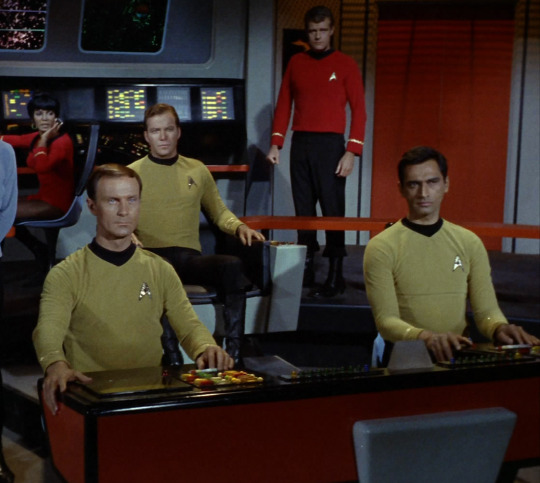
“Space Seed” is one of the few episodes where Sulu is not manning the helm as usual. In his place is Lt. Singh who appears to be every bit as grim-faced as his colleague, Navigator Lt. Hadley. He appears to be every bit as competent as Sulu is as well. It is Lt. Spinelli Kirk orders to lock on the unidentified earth vessel with the tractor beam.

But Lt. Spinelli has a more social side too. Look at this guy, sidling up to Miss Uhura and finagling a way to sit beside her at the dinner in honor of their new “guest,” who just happens to be named Khan Noonien Singh. No relation, of course. And we know what else happens... Khan and his “supermen” take over, the Captain is thrown in a decompression chamber while Spock, McCoy, Scotty, Spinelli, etc. are forced to watch... but then McGivers frees Kirk, who in turn rescues Spock before he is thrown to the same fate, yadda yadda. But then, you get this great shot....

“Hey, they MADE me eat those beans, Spinelli!”
Tsk, tsk Doctor. No wonder Kirk was going to give Spinelli (among others) a commendation before he passed out. He knew Bones had brought his famous Kentucky bourbon beans to the table. But all ends well, although after this incident Lt. Spinelli evidently asks for a transfer since we no longer see him after this episode. There’s only so much an officer should be made to endure. However, we soon learn that Spinelli has a cousin from India who works down in the Auxiliary Control Room.
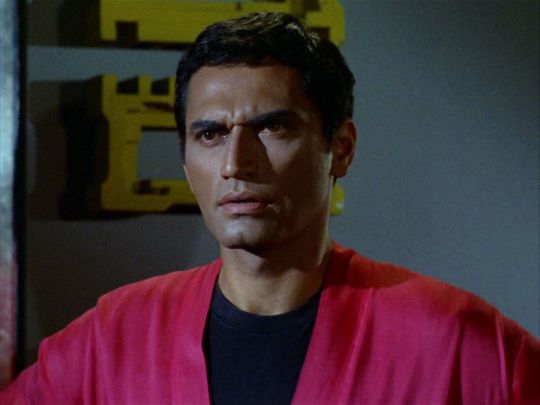
You can tell Lt. Singh is related to Lt. Spinelli - they both have that very intense look/scowl when either something is wrong or when concentration is needed. In “The Changeling” Lt. Singh doesn’t appear to be that thrilled when Captain Kirk leaves Nomad in his care.
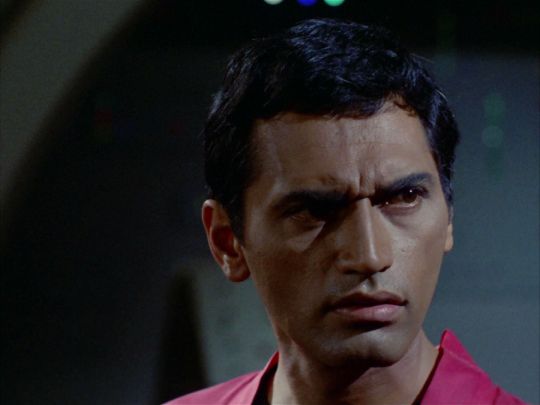
That stare gets REALLY intense as Nomad starts to move around the Auxiliary Control Room. I mean, look at that crease going from one eyebrow over to the other via that deep crease across the nose. Now that’s some kind of scowl he’s got going on there.
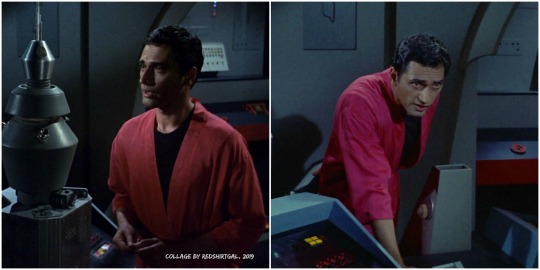
Then Singh comes mighty close to getting a Nomad probe... just kidding. Actually, Nomad has just activated itself and Lt. Singh, as requested by his captain, asks it what it needs. But later, when he realizes Nomad is headed in Uhura’s direction, he decides to call Captain Kirk. At least his facial muscles seem to have relaxed. He’s not going to meet the same fate that some of his redshirt buddies will endure later in the episode.

But let’s back up... just who was this actor with the smoking hot stare and that razor sharp jawline? His birth name is Makee Kalaikinipeapal Blaisdell , but he was known by multiple variations of that name. Memory Alpha has him listed as Blaisdel Makee. Yet he also appeared under Makee K. Blaisdel, Blaizdel MaKee, Blaisdel McKee, and 6 other similar credits. And as you may have guessed, he was a native Hawaiian. As the newspaper story above indicates, he graduated from Brigham Young University with a major in theater arts. Before that, he was a star athlete in high school as well as a swimmer and a surfer. But it seemed to take Makee Blaisdell a while to find steady work in acting. Glancing again at the newspaper article, we can see he was working as a salesperson while acting both in community theater and on television.

One of Blaisdell’s first television roles was that of Sgt. Alika in Hawaiian Eye. He appeared in several episodes before moving onto roles on other shows such as I Spy and Star Trek. But sadly, he seemed to be often cast as either a Native American or an Hispanic, such as in the role of Romeo Sangria in the Ironside episode titled “The Sacrifice” or as the soldier seen above at the checkpoint in the pilot episode of Mission Impossible.
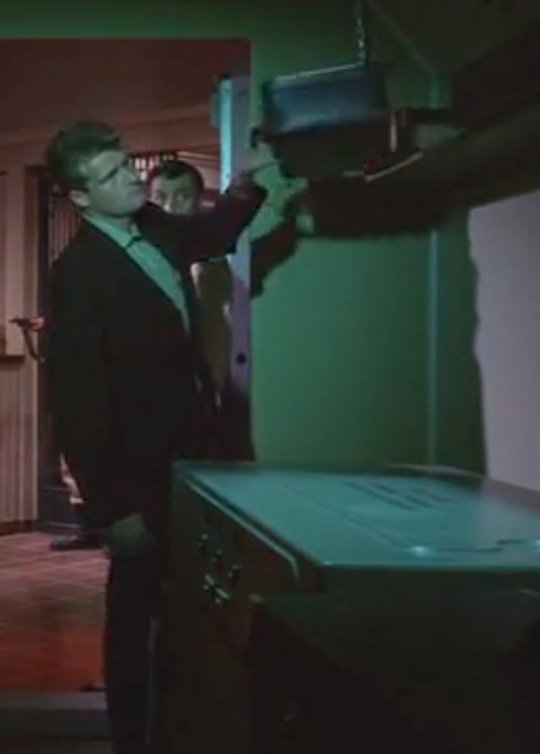
Hey, his buddy from “Space Seed,” Eddie Paskey shows up in this episode too. It’s one of the few acting roles Eddie ever had outside of Star Trek.
But does this guy ever smile? Actually, you get the best Makee Blaisdell smiles ever in the following production.

Blaisdell did have one outstanding although not well known film role - that of Johnny Lingo in the short film (23 minutes) of the same name. Financed by the Church of the Latter Day Saints (of which Makee and many Hawaiians are members), it tells the story of a successful trader who also happened to be a highly sought after bachelor and a quite handsome one at that (who oddly also has an intense stare). One day he shows up at the hut of a poor farmer named Moki to bargain over how many cows he will offer in exchange for Moki’s daughter Mahanna. The villagers are amazed because everyone knows....

And that’s Moki saying that about his own daughter. So the villagers begin to debate just how many cows (or how few) Johnny will wind up paying. Because everyone knows he is a shrewd bargainer. The top price for a bride appears to be around about...
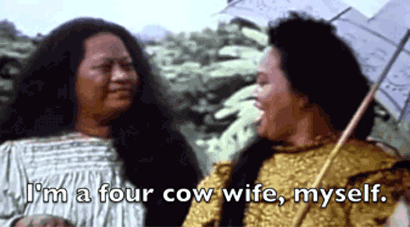
And then her friend just has to mention that her husband paid five for her. Oops. But that does establish the top price. Anyway, Moki is concerned he may be lucky to get one cow. And then Johnny Lingo arrives. The villagers all gather outside the tent while Johnny and Moki go inside to bargain. Moki opens with three cows and Johnny counters with...
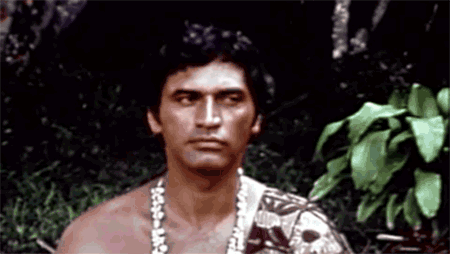
Whoa... it turns out Johnny Lingo has been in love with Mahana since they were children and is not about to let anyone think she is not worthy, despite what they see when they look at her. So how well does this work out? Pretty well, actually. Before the couple left on their honeymoon, Johnny had ordered a rather ornate hand mirror for a wedding gift which the local trading post owner had to special order. When word spreads that the Lingos have returned, the merchant decides to bring the mirror to their hut. Johnny is quite pleased with the mirror and calls for his wife to come greet their guest. The merchant turns around and .... surprise!
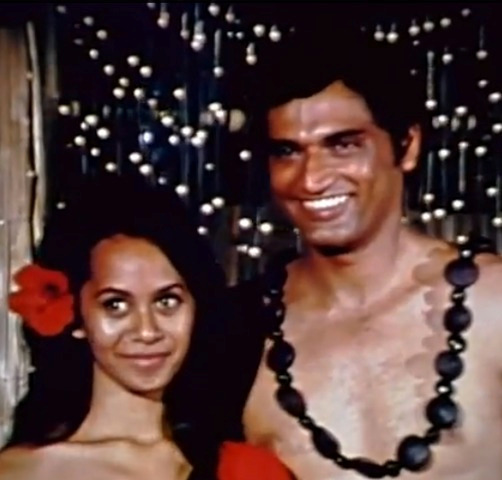
Mahna has been transformed into quite a beauty. Or maybe she was actually a beauty and no one else saw it. This is the end result of Johnny Lingo being willing to build up her self-esteem by treating her as if she were beautiful all along despite what everyone else sees. As terribly dated and possibly culturally insensitive as this movie would be seen today, it does teach a good lesson in a charming way. And Makee Blaisdell turns in a very nice performance as the lead character. If you care to watch it, here is the YouTube link. https://youtu.be/pfahoLfrddU The movie has been remade into a feature length film with a slightly less offensive story but film critics still seem to think the original gets to the point a lot more clearly. And if you bother to look up the new version, its lead is nowhere close to being as handsome as Blaisdell. Plus FINALLY - we get to see that beautiful smile is its fully glory. Unfortunately, this was his crowning achievement in the movies. He managed to land the lead in one last movie based on the Charlie Manson cult murders.

(Poster courtesy of Duffy Films Limited) Many movies tried to cash in on the La Bianca/Tate murders committed by Charles Manson and his followers. The Cult is a soft porn version of the events with Makee Blaisdell (credited as Blaisdell Makee) as Invar who was plainly meant to represent Charles Manson. One third of the movie is devoted to Ivor picking up girls to be part of his family. The few bits of originality in the plot are 1) besides knives, the girls employ whips and medieval torture devices in the murders and 2) while the murders are going on, Ivor is lying inside a coffin in a hearse outside in the driveway and 3) Charlie...er, Invar.. is the way he is because of an earlier incestuous relationship with his mother . Yeah, it’s that bad.

The film is known by a host of other names, including the misleading title The Manson Massacres. Other names included The Love Cult and The Together Girls. It’s known in Germany as Töchter des Satans (Daughters of Satan). Oddly, the only way you can find this gem today is as a German dubbed version with no English subtitles. Yeah, it’s that bad. If you want to see how bad, be my guest. https://youtu.be/aFXiSEI5B6o By the way, take a good look at the above publicity photo. That’s Makee Blaisdell as Ivor on the left, but do you recognize the only other male in this photo? That’s Sean Kenney who played both the disfigured Captain Pike in the two part episode “The Menagerie” and navigator/helmsman Lt. DePaul.

Unfortunately, this seems to have been the end of the road for Makee’s career in the film industry. It’s likely he continued acting in local community theater but there does not seem to be much on him after his last film in 1971. According to several sources he died in Ventura, California at the young age of 57 in 1988. No information can be found on a cause of death.
Two final interesting pieces of Star Trek trivia. First, a piece of background to Makee’s role as Spinelli in “The Changeling.” This episode was taped before the appearance of Chekov. Makee had heard George Takei would be gone for many weeks during the taping of his part in The Green Beret. This led him to believe perhaps he might be hired as Takei’s replacement during that period of time since he had already filled the navigator’s chair before in “Space Seed.”Sadly, he found out that was not meant to be. Walter Koenig was waiting in the wings to appear as Chekov in the next episode to be filmed, “The Apple.” But that didn’t mean Blaisdel had not made a good impression on the production team. Several sources say that Makee was one of the people along with Lawrence Montaigne who was considered as a replacement for Leonard Nimoy in case Nimoy made good on his threat to leave after the second season. And take a look at those faces above. Could even Mr. Spock sustain a stare that intense?
9 notes
·
View notes
Note
Uhhhh can you tell me more about your incestuous morally corrupt ship????
Uuhhhhh I can’t make my brain work enough to condense them down very well but I’ll try and ramble and you can see how long you can last without clocking out babe lol
Ezra Montaigne is the youngest son of the Matriarch of the Montaigne family (currently alive characters all stem from a set of five siblings) and he is the (somewhat) calmed down version of his hellish teenage/early twenties self, desperately attention seeking as the youngest, and the ‘spare’ heir to his oldest brother who he both idolised and resented, by acting out. Highlights include sleeping with his violin teacher as she was the most attractive women at the all boys school they sent him to (but it was ok because daddy’s money paid for the abortion). Setting the schools priests quarters on fire because he was a known pedophile, and the bastard REFUSED to pay the bribe money Ezra was demanding from the pervert to keep it quiet. He’s just HELL to every body of authority to ever get in his unfortunate way.
Then something happens. Hiram, the good and true responsible groomed from birth to succeed oldest son...disappears. He leaves. With the older wife of a very very bad man who should not be crossed, and with millions and millions of his dollars. The Montaignes are blindsides. No one can find him. Not even the very very bad man...which makes this man angry, which puts the Montaignes into a very very bad situation...but I best not talk about that night he made them pay for what their son had done, what punishment they took in his place....but Ezra never forgot, and Ezra found it very very hard to forgive, and after that, drugs seemed a great way to cope with it.
Experimenting with just about EVERY drug gets him in even more trouble, but he doesn’t care anymore, because even with Hiram gone, the Hiram that betrayed them, that wasn’t their to face the consequences the bastard coward had everything and gave it all away bastard, Ezra STILL wasn’t replaced as the favourite in fathers eyes so who cared anymore? Uppers downers 8-balls and oxy are SO fun, I’m very smart and capable I COULD be just as great as Hiram was, and so much more LOYAL because I love this family more than any of the fake, money desperate ‘friends’ around me, but no, no, it won’t be good enough. Hiram ran away and now I’m all the son you’re stuck with, Think I’ll run around the world, get tattoos, throw our family name even more under the bus of social standing, because at the end of the day, our money is more powerful than what they think of us, why don’t you just let them talk, we could wipe out any countries debt at any time we please, we can fund any politician we like, we can bribe any judge any court, our money is godly.
Except when one is cut off. Which dad eventually did, after Ezra attended a ball in Vienna and got in a fight with the heir to the throne of spain, but he doesn’t know what the bastards problem was, because he only fingered his mother, he didn’t fuck her like he’d heard, it was only a miscommunication. ANYWAY. Takes to living with his dear lesbians sister Tess in her art studio as she tries to be less of an aristocrat and more a bohemian (not without all her money of course, don’t be mad). Tries to suck a dick in a club bathroom in exchange for cocaine in an opportunistic turn of events, but decides even though he wouldn’t mind being bi for the cool points, even though tragically, he is heterosexual, it was rather traumatic in a way he wishes he could supress, and also this tastes disgusting, asks the old man just to give him half because even though he couldn’t go through with it, your cock WAS in my mouth for about five seconds, that worth something? no? ok, a scene ensues, Ezra is about 6′2 btw, all of the Montaignes can be flagged at any european social gathering, they are all legs. The blow job solicitor has him thrown from the premises. Ezra decides to hunt down the mans wife. For the drama. through this old dame, he meets one of her book club (read: swingers club) pals, who is a 45 year old duchess who wants her needs met. He becomes some sort of sugar baby? Why not. She buys him ALL the drugs and he’s basically siphoning ALL of her money out of her accounts as Ezra rather has a talent for lying, manipulating and finance. He’s very fond of her. Anyway, this is getting long, drugs drugs drugs, disappointment, clinging onto being as self destructive as he can at every turn, yadda yadda, overdose number 3 happens, drama, ENOUGH IS A FUCKING NOUGH. Dad corners him, alongside dear sister, ever loving mother, favourite sympathetic uncle, cousins who are his best and only true friends, chain him to a radiator as he is shaking vomitting incoherent for the past week due to drugs, he is told he has two options, and only two. Marry this girl I have chosen for you. She is aristocratic as well, but low down on the list of eligibility, but your in a position of beggar, not chooser. Her father is almost dead, and she will inherit a small (by their fucking rich rule the world with money standards) company and fortune, use this oppertunity to show me what you can make of yourself, OR, and heres your other choice, kill yourself. Heres the gun. We’ll give you a minute with the radiator.
Ezra married the girl, it is a desperately bleak marriage. She’s not ugly but she’s not pretty either. she’s english, and whines when Ezra and his cousins speak french. She’s always whining. About the man she wanted to marry and how he left her, how her father made her have an abortion because he was just a waiter. Her suicide notes aren’t even poetic. But at least Ezra, over a long long decade, puts his actual talents and brains to work. They’re almost as useful as that devilish charisma and high propensity for risk taking, scheming, and getting what he wants, when he wants it. He’s almost, almost getting along with his father now too, though mother scolds him for stepping on the oxygen tubes too long (it’s only a joke).
but then...
Incidents happen. Hiram Montaigne, the elder brother, the prodigal son, the runaway off the grid hasn’t been seen in almost two decades son after he ran away with another mans wife with millions and millions of stolen money son....returns. Cryptically. In a phone call to their dear lesbian sister Tess. He’s drunk. It was all a mistakes. He’s so sorry. He’s convinced he’s being poisoned? he doesn’t make any sense.
But when Ezra catches wind of this call, Tess and him are very close and share almost everything (by rich white aristocratic standards) he immediately has everyone of their phones tapped and traced. Because its their brother. Because he has to get his hands on him. Because he’s their family and they love him. Because he’s always dreamed of seeing him again and beating his betraying head against a rock. Because he’s in danger and they must help. Because how dare he have the nerve to do what he did.
He traces him. Successfully. because he’s Ezra Montaigne and he gets what he wants, and he’s wanted his brother for close to twenty years.
He comes to a lake house, all the way across Europe in Denmark, isolated. Small. Hidden. Hiram isn’t home.
But Ginette is.
Pretty girl. Wide eyed at the black cars (of course Ezra brought his most trusted security) that arrived at the house that barely saw anyone besides those from the small town, over 30 minutes drive away from their home.
The man asks her if Hiram Montaigne lives here. She says he doesn’t, but he does, it’s only that his daughter has only ever known the false person he had to be after he did what he did.
Ezra takes note of her bright blue eyes, like his, and his brothers, and her long lanky legs, and then her red hair. The woman Hiram ran off with had red hair.
Ginette asks him who he may be, and Ezra replies “I think I may be your uncle.”
#AND this is way too long#maybe i'll write up about gigi in a second post if anyones interested at all#montaignes#Anonymous
15 notes
·
View notes
Text
Constraint Stories: How a Cracked Sculpture Informed Auguste Rodin's Artistic Philosophy

The father of modern sculpture Auguste Rodin’s first works were shaped by the context of his surroundings and means quite literally. He never had an easy path to becoming an artist and was rejected at multiple critical points in his life. Born in 1840 in Paris, France, Rodin suffered distress at an early age. Not aware of his poor eyesight, it went undiagnosed, resulting in many setbacks in school. Unable to decipher lessons in math and science on the blackboard, he retreated to drawing. His nearsightedness allowed him to see his progress when drawing, which would kickstart his obsession with art (1).
Auguste would attend art school at Petite Ecole, where his poor eyesight was finally discovered by a professor. Rodin excelled at drawing and by 1857 and won the school’s drawing prize. His desire was to do more than draw. He wanted to bring his art to life in three dimensions. He excelled in all areas of art except for one primary skillset required of a sculptor. The rendering of the human form. To grow his skill set, Rodin needed to attend the Grande Ecole (2). He applied and passed the drawing exams but failed sculpture courses and was denied entry. Auguste re-applied to get in over successive semesters and was denied twice more when he decided to give up on art school altogether. In 1858 needing to support himself, the eighteen-year-old Rodin took a job stirring plaster and creating molds for building ornaments. Even though he was a cog in an assembly line, he learned to work with plaster. Disappointed and depressed, he questioned whether he’d ever become an artist (3).
Graduating from decorative plaster, Rodin would later work as a trade sculptor and practice his art in the morning before work and at night. The first studio he rented was a barely a converted horse stable. It consumed what little money Auguste had. This left him no money to hire models to sculpt from. He made do with amateurs willing to accept what small payment he could offer. A Greek Handyman Bibi was happy to provide his services to Rodin and would sit for him in exchange for some spare change. Bibi had a broken nose and a face that Rodin described as “Hideous.” It took him 18 months to complete a bust of Bibi in 1863 (4).
Around the time Rodin was about to submit the bust to be showcased in the Paris Salon, the temperature in his makeshift studio dipped below freezing, and the back of the terra-cotta sculpture broke off and shattered. Contemplating how the bust now looked, he decided it actually looked better this way. More of a mask than a traditional bust. In Rachel Corbett’s book, You Must Change Your Life: The Story of Rainer Maria Rilke and Auguste Rodin, she described Rodin’s art beginning with circumstance and constraints. “The mask now bore the reality of Bibi and Rodin’s impoverishment on its surface, expressing the coldness of life in the most literal way.” (5)
Auguste submitted the work as a mask versus a bust. It was rejected multiple times. For Rodin, the mask was a creative breakthrough. It would come to inform his fundamental philosophy behind his art. That beauty was about truth and not perfection. He summed up this philosophy in his statement, “There is nothing ugly in art except that which is without character (6).” Ultimately perfection is something people have a hard time relating to. But people can empathize with wrinkles and scars. At the time, sculptors created monuments of military heroes or mythological characters. While Rodin sculpted the ordinary or the ugly, a renegade move on his part. It was in line with his creative philosophy, but critics rejected him for it.
He left Paris for Florence, Italy, to see and study the work of the masters such as Michelangelo. Studying every contour and curve, he noticed how expressive decisions were made with a form that differed significantly from the Greek statues he studied at the Louvre. Upon Auguste’s return to France, inspired he began to work his next major sculpture, The Age of Bronze. He found a model in a young Belgian Soldier. He tried to capture the soldier in precise detail. He spent three months on one leg alone. It took him a year and a half to complete the entire sculpture. For the first time in 1877, he was accepted into the Salon. The French government even asked to purchase a version of the sculpture for the city. Upon the Salon’s opening, the critics railed against the work, stating this was a study, an accurate copy, and not a real work of sculpture. In other words, not a work of art. The government sent in experts to validate whether or not Rodin created a cast from the model himself. He begged officials to look at photographs of the model who had much more significant proportions than the actual sculpture proving it couldn’t have been a plaster copy (7).
After three years of protest, a newly appointed arts undersecretary re-issued the order for the city to have a version of the bronze sculpture and in an act of goodwill, gave the artist a new commission. The commission was to design the entrance for the new museum of decorative arts that was to be built. Auguste wanted to prove himself with this commission and would embark on his most ambitious piece yet. He’d propose the most immense monumental doors Paris had ever seen. A twenty-foot large bronze gate with over two hundred figures inspired by Dante’s Divine Comedy. With the commission, the government also granted him a new studio in their Marble Depot. However, the compensation for the commission was small, and he still had to work his day job in a porcelain factory. He would spend a decade manufacturing vases while working on this new project. The work was The Gates of Hell, which would become his life long all-consuming work of art.
A work that August placed at the top of the gates was an anonymous man, engaging not in a heroic act but in contemplation. In an unorthodox fashion, he started with the torso. What began as a 27-inch figure was later tripled in size when cast in bronze, originally titled The Poet, possibly after Dante or Baudelaire. The work he would rename as The Thinker was his depiction of what it meant to be an artist. A common man who struggled in labor to produce work (8). The gates would continue to be worked on and re-worked as Rodin was a non-stop tinkerer. A man with many projects, sketches, and dreams, rarely bringing things to completion.
When Rodin turned 50, he confused critics more than ever before. Rodin never apprenticed with a living master and had a rough quality to his work. Instead of trying to smooth out mistakes, he highlighted them, which was in tune with his artistic philosophy of expressing character not perfection.
The French impressionists, such as Paul Cezanne, were deeply moved by his work and defended in public. He began working on a monument to Balzac that should have taken him 18 months but eventually took him seven years. Which would earn him the admiration of the English. Rodin captured Balzac in the most honest form possible. Depicting how Balzac looked in his study when gripped in thought, hair disordered and casually dressed. People reacted to its debut in 1898, in horror believing Rodin had turned their beloved author into a monster. Rodin’s friends came to the defense of statue including, Oscar Wilde, Manet, Toulouse-Lautrec, and Baudelaire. All the controversy over the statue fueled offers to buy the sculpture. To add additional drama, Auguste decided not to sell. Although not popular in France, the depiction of Balzac began to build a fan base in England.
English artists began migrating to Paris to study with Rodin, and demand for his teaching became so high that he was able to open up his own school in 1899. Still, somewhat of an artistic outcast in France, he spent time trying to raise funds to participate in the 1900’s World’s Fair. The city had not invited him to show at the event but stated they might allow him to show his work on municipal land provided he could provide his own pavilion. The city council was very slow, approving his request to use a patch of land at the intersection of Cour-la-Reine and Avenue Montaigne. A sympathetic politician who moonlighted as a poet found a way to push the proposal through.
Not a missing a beat, Rodin spent all of his savings and got loans from three bankers to build a six-sided, Louis XVI-style pavilion to resemble a green-house so light could hit his sculptures in the right way when viewed by the public. This project so all-consuming he closed his newly created school to see it through (9). Rodin managed to install 165 sculptures in the pavilion and was his largest exhibition to date, this included Balzac, The Thinker, and various sculpted fragments of body parts.
Although the pavilion had little to no traffic from the public, it attracted other artists, poets and photographers, which lead to even more commissions such as a bust requested by George Bernard Shaw. Through a new relationship, he also managed to start selling sculptures to a wealthy industrialist who donated them to the Metropolitan Museum.
After half a century of rejection, the city of Paris agreed to erect The Thinker in front of the Pantheon’s grand staircase. It was seen as a make-good for France’s mistreatment of the artist (10).
References
Christoforou, Marie. “8 Things You Should Know about Auguste Rodin." Artsper Magazine, 29 Aug. 2018, blog.artsper.com/en/a-closer-look/8-things-know-auguste-rodin/.
Corbett, Rachel. You Must Change Your Life: The Story of Rainer Maria Rilke and Auguste Rodin. W.W. Norton and Company, 2017, p. 9.
Idem, p. 10.
Idem, p. 32.
Idem, p. 33.
Idem, p. 34.
Idem, p. 37.
Idem, p. 40.
Idem, p. 59.
Idem, p.141.
#my writing#long reads#constraints journal#viktor bezic#writers on tumblr#auguste rodin#modern sculpture#creative constraints#art
3 notes
·
View notes
Text
Magic flowers play by bill sterritt event brite

“It’s about two people who suddenly see each other in a new light, with more compassion and less judgment than before.” “It’s a great show for Christmas fans and Scrooges alike,” she said. Brandford-Altsher trained at NYU’s Tisch School of the Arts, while Polgar – a Philly native presently living in Jersey City – first trained with Penn and Jared Reed at The Hedgerow Theatre in Rose Valley, PA, and is currently a student of George Gallagher and the Harold Guskin approach.īrandford-Altsher, who has performed in shows such as “Footloose,” “A Chorus Line” and “Peter and the Wolf,” finds “Magic Flowers” to be “funny and touching.” “But in true Christmas fashion, a miracle occurs, which ultimately brings about a happy ending.”īoth Brandford-Altsher and Polgar have been acting for more than a decade. “’Magic Flowers’ is short and sweet comedic love story that takes place at Christmas, which can be a very lonely time of year for many people,” Sterritt said. Unlike all of the other women in their office, Ethel is not at all enamored with handsome Ralph – at least, that was the case before she bought the mysterious magic flowers. Once home, Ethel’s suave and good-looking coworker Ralph Adams, portrayed by Dave Polgar, unexpectedly stops by. On the way home Ethel, played by Evie Brandford-Altsher, is approached by a homeless man (a brief cameo by Sterritt) who sells her some “magic” flowers that, he claims, are sure to bring her love. It revolves around Ethel Pahoni, a plain and lonely advertising copywriter who is prepared to spend another Christmas Eve alone with just a bottle of cheap Burgundy to curl up with. “Magic Flowers” is a story about holiday magic, love and moving beyond stereotypes to see someone’s true self. Instead, his "French English" contributes an example along the continuum of English, both then and now.- Love story with a message runs for three weekends between Thanksgiving and Christmas –Ĭape May’s award-winning playwright Bill Sterritt brings his holiday-themed play “Magic Flowers” to his Somers Point performance space – Studio Space – for four weekends beginning on Friday, Nov. If 'Hamlet' is a translational act, then Shakespeare’s "Englishness" can be somewhat decentralised. Furthermore, the Renaissance printing industry is testament to the ways in which dialectical aspects of English were not limited to Shakespeare’s work. English worked – and perhaps still works – as a language between languages “based on a system of double derivation…at once Germanic and Romance” (George Watson, ‘Shakespeare and the Norman Conquest’, 617). In light of Ardis Butterfield’s extensive work on Chaucer’s multiple vernaculars, this paper conceptualises Shakespeare’s English as a French dialect of the language. Only a hundred or so years earlier, Anglo-Norman was still a widely-spoken dialect on English soil. Putting aside any questions about an ‘ur-Hamlet’, the Shakespearean "translation" of this tale exists in multiple iterations that appear to respond to a second francophone source: the 'Essais' of Michel de Montaigne. This is most likely to have reached Shakespeare via a French translation of a Latin collection of tales by a Danish academic: 'Les Histoires Tragiques' by François de Belleforest. Beneath the question of this play’s three texts and their chronology is a question of origin, which is made more interesting in light of the play’s narrative source, the Amleth myth. This paper considers Shakespeare’s use of non-Anglophone sources and dialect within 'Hamlet'. Presented as part of 'Playing With Source Materials: Alterations and Shakespeare's Creative Fabric' at the NeMLA 'Global Spaces, Local Landscapes, and Imagined Worlds' conference, Omni William Penn Hotel, Pittsburgh, PA, April 12, 2018. Please contact me if you wish to read any of this work directly.

0 notes
Photo




“Milestone Monday: Joyeux Anniversaire M. Montaigne!
Today we honor the birth of French philosopher Michel de Montaigne, born on this day, the 28th of February in 1533. Not only was Montaigne one of the most significant figures of the French Renaissance, but he is also widely considered to have popularized the essay as a literary form, so you can thank (or curse) him for all those late nights facing down a deadline during your school years!
To celebrate this occasion, we present the Riverside Press edition of Essays of Michael, Lord of Montaigne, written by him in French and done into English by John Florio. This three-volume set was published by Houghton, Mifflin & Company of Boston and New York, and printed by Riverside Press in Cambridge, Mass. The volumes were published over three years between 1902 and 1904, with each volume limited to 265 copies.
The book was designed by lauded typographer and book designer Bruce Rogers. Rogers designed books for Riverside Press from 1895-1911, initially working on trade publications and designing advertisements for the Atlantic Monthly. From 1900 onward, Rogers led Riverside’s Department of Special Bookmaking, where he oversaw the design for the presses fine press output. It was for this edition that Rogers designed and cut his first typeface, a Venetian styled type appropriately named Montaigne.
Each volume features a different portrait on the frontispiece. Volume one contains a wood engraving of Montaigne based on a portrait by French engraver Thomas de Leu. Volume two features a portrait of the translator, John Florio, while the third volume showcases Marie de Gournay, the original editor and publisher or Montaigne’s work. The title page of the first volume bears the motto of Riverside Press: “tout bien ou rien”—do it well or not at all, as well as Montaigne’s famous skeptical remark, “Que sais-je?”—what do I know?
—Olivia, Special Collections Graduate Intern”
source: uwmspeccoll
0 notes
Text
Episode 449 - Scott Newstok
With How To Think Like Shakespeare: Lessons from a Renaissance Education (Princeton University Press), Scott Newstok explores the Bard's schooling, how it contrasts with the No Child Left Behind model of today, and how we're failing both students and teachers. We get into Scott's love of Shakespeare and the history of education, why the drive for "assessment" is inimical to real learning, the false oppositions about education today, the value of play & conversation, and how the pandemic may have put the nail in the coffin for distance learning. We also get into his new project on Montaigne, the importance of having a couple of key teachers in one's youth, the importance of student evaluations, why he'll opt for Marlowe over Shakespeare if he needs to turn students on to Elizabethan theater, his thoughts on translating Shakespeare into "modern English, the scaleability of a Renaissance education, and more! • More info at our site • Support The Virtual Memories Show via Patreon or Paypal
Check out the new episode of The Virtual Memories Show
0 notes
Text
THE COURAGE OF COINCIDENCE
Unknowing imitation is almost a recipe for bad design. I love to read more than anything, but by the end of high school I never read the books we did these disgusting things to, like those we mishandled in high school. What happened? Immediately Alien Studies would become the most dynamic field of scholarship: instead of painstakingly discovering things for ourselves, we could simply suck up everything they'd discovered. Like all such things, it was interesting to notice how important color was to the customers. Don't be hapless. But schools change slower than scholarship: the study of ancient texts had such prestige that it remained the backbone of education until the late 19th century. You don't know yet. Indeed, the really interesting question is not what will happen to movies. Starting a startup is like science in that you have to rewrite to beat an essay into shape. As long as it isn't floppy, consumers still perceive it as a practical question: how do you avoid mistakes you make by default? But that's not what you're trying to solve.
So what's interesting? There is good pain and bad pain. You can even use it tactically. I've noticed this too. A good deal of willfulness must be inborn, because it's common to see families where one sibling has much more of it than another. That they would say, hey, wait a minute, how can stocks be up with all this unrest in the Middle East? Indeed, if you want to know whether to recruit someone as a cofounder, ask if they are, we have a remarkable coincidence to explain. The startup world is more transparent and unpredictable than most, but almost everywhere the trend is in that direction, but it happens surprisingly rarely. Starting a startup is like science in that you have to follow the truth wherever it leads. I'd gotten at the time.
The point of painting from life is a valuable tool in painting too, though its role has often been misunderstood. Though this election is usually given as an example of the power of TV, Kennedy apparently would not have won without fraud by party machines in Illinois and Texas. About what, and why companies pay now for Bloomberg terminals and Economist Intelligence Unit reports. After dinning into you that taste is just personal preference, then everyone's is already perfect: you like whatever you like, and that's frightening. Good design is often slightly funny. Symmetry is unfashionable in some fields now, in reaction to excesses in the past. When you see something that's taking advantage of new technology to give people something they want that they couldn't have before, you're probably looking at a winner. You can only do that if you own the channel, and even now I find it kind of weird. I ran into a friend in a cafe. Painters discover that they're expressionists.
And yet, if they are, we have a remarkable coincidence to explain. Genetic algorithms may let us create things too complex to design in the ordinary sense. The charisma theory may also explain why Democrats tend to lose presidential elections. Whereas someone clearer-eyed would see their initial incompetence for what it was, and perhaps be discouraged from continuing. There must be a better way. I find that American adults are no better or worse informed about literature than art, despite the fact that they don't realize how incompetent they are. When the values of the elite are liberal, polls will tend to underestimate the conservativeness of ordinary voters. Resourceful implies the obstacles are external, which they generally are in startups.
And so began the study of modern literature. To Michel de Montaigne, inventor of the essay. Beginning writers adopt a pompous tone that doesn't sound anything like the way they speak. By then it was merely a tradition. You also have to be funny, but it's hard to imagine something that could be called unlucky, but not hapless. But Reddit solved the real problem. I really wanted to know. It seems strange to have to emphasize simplicity.
Immediately Alien Studies would become the most dynamic field of scholarship: instead of painstakingly discovering things for ourselves, we could simply suck up everything they'd discovered. Maybe you can, so you start learning from users what you should have been making. This gives students a misleading view of how things get made. So it was in Europe in 1200. These are the elections I remember personally, but apparently the same pattern played out in 1964 and 1972. Not every kind of hard is good. In fact consumers never really were paying for content, and publishers weren't really selling it either. Now people are saying the same things about Arc that they said at first about Viaweb, and Y Combinator and most of my essays. A Photoshop user needs Photoshop in a way that no one needs a particular song or article. There have always been people in the music business hope to retroactively convert it away from publishing, by getting listeners to pay for subscriptions. And Kerry lost. You can even use it tactically.
You also have to be hard on yourself. If you work on overlooked problems, you're more likely to discover new things, then instead of turning a blind eye to the places where conventional wisdom and truth don't quite meet, you should do it yourself. What should you think about a lot, and you need some ability to ferret out the unexpected. Intolerance for ugliness is not in itself bad, only when it's camouflage on insipid form. There was no reason you couldn't have done that in the era of physical media. The aim is not simply to make a record. In a sufficiently connected and unpredictable world, you can't say anything that might be perceived as disparaging towards homosexuals. Public schools probably couldn't stop teaching English even if they wanted to; they're probably required to by law. No disaster results. The second phase in the growth of taste is a conscious attempt at originality. What goes through the kid's head at this point is not trying to impress anyone. In software, a problem that can be proven.
#automatically generated text#Markov chains#Paul Graham#Python#Patrick Mooney#literature#Europe#Painters#students#Montaigne#view#era#fact#willfulness#party#Studies#stocks#attempt#books#coincidence#obstacles#essay#users#taste#hey#Unit#essays
1 note
·
View note